Difference between revisions of "Velimir Khlebnikov"
Jump to navigation
Jump to search
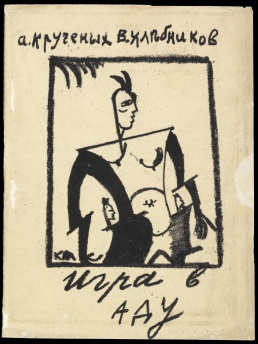
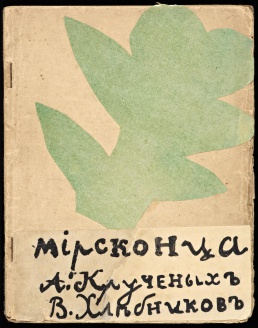
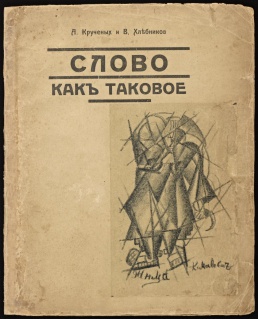
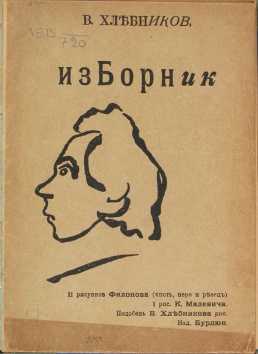
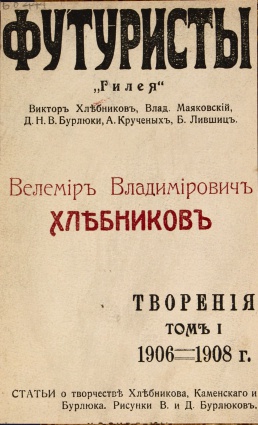
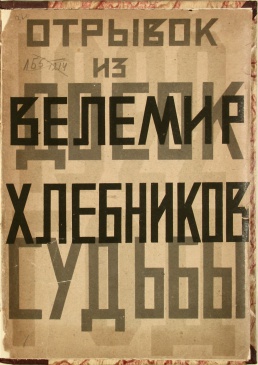
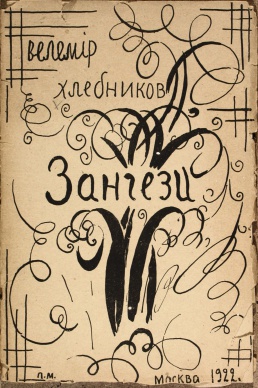
| Line 43: | Line 43: | ||
[[Image:Khlebnikov_Velimir_Otryvok_iz_Dosok_sudby.jpg|thumb|258px|''Otryvok iz "Dosok sud'by"'', [1922], [http://elib.shpl.ru/ru/nodes/3195 JPG].]] | [[Image:Khlebnikov_Velimir_Otryvok_iz_Dosok_sudby.jpg|thumb|258px|''Otryvok iz "Dosok sud'by"'', [1922], [http://elib.shpl.ru/ru/nodes/3195 JPG].]] | ||
[[Image:Khlebnikov_Velimir_Zangezi.jpg|thumb|258px|''Zangezi'', 1922, [http://elib.shpl.ru/ru/nodes/3191 JPG].]] | [[Image:Khlebnikov_Velimir_Zangezi.jpg|thumb|258px|''Zangezi'', 1922, [http://elib.shpl.ru/ru/nodes/3191 JPG].]] | ||
| − | |||
| − | |||
| − | |||
| − | |||
| − | |||
| − | |||
| − | |||
| − | |||
| − | |||
| − | |||
| − | |||
| − | |||
| − | |||
| − | |||
| − | |||
| − | |||
| − | |||
| − | |||
| − | |||
| − | |||
| − | |||
| − | |||
| − | |||
| − | |||
| − | |||
| − | |||
| − | |||
| − | |||
| − | |||
| − | |||
| − | |||
| − | |||
| − | |||
| − | |||
| − | |||
| − | |||
| − | |||
| − | |||
| − | |||
| − | |||
| − | |||
| − | |||
| − | |||
| − | |||
| − | |||
| − | |||
| − | |||
| − | |||
| − | |||
| − | |||
| − | |||
| − | |||
| − | |||
==Works== | ==Works== | ||
Revision as of 11:08, 6 September 2015
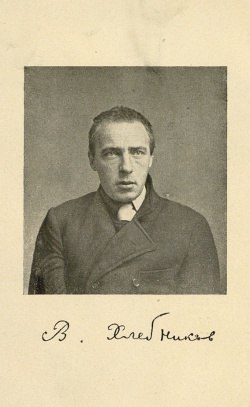 Khlebnikov in 1916. [1] | |
| Born |
November 9, 1885 Maloderbetovsky ulus, Astrakhan Governorate, Russian Empire (now Malye Derbety, Kalmykia |
|---|---|
| Died |
June 28, 1922 (aged 36) Santalovo, Kresttsy county, Novgorod Governorate, Soviet Union |
| Web | Ubuweb Sound, Ubuweb Sound, Wikipedia, Wikipedia-RU |
Velimir Khlebnikov [Велимир Хлебников; born Viktor Vladimirovich Khlebnikov, Виктор Владимирович Хлебников; 1885-1922), was a writer, sketcher and poet, also interested in mathematics, history, and mythology.
Chronology
Based on chronology in Khlebnikov, The King of Time, ed. Charlotte Douglas, 1985, pp 239-247.
- 9 Nov 1885: K. born in village of Malye Derbety, ca. 80 km south of Volgograd.
- 1903: Graduates from Kazan gymnasium; enters university.
- 1908: Sends early poems to Ivanov. Moves to Petersburg; enters university.
- 1909: Meets Kamensky. Publishes first literary piece.
- 1910: Plans trip to Montenegro. Meets Burliuk and Matyushin. Breaks with Ivanov and Symbolists. "Incantation by Laughter" published in Kulbin's Impressionists' Studio [Студия импрессионистов]. The collection A Jam for Judges [Садок Судей] published; includes "O Garden of Animals!".
- 1911: Meets Mayakovsky. Working on theory of history.
- 1912: Visits Burliuk estate in southern Russia. A Game in Hell [Игра в аду] by K. and Kruchenykh. Contributes to A Slap in the Face of Public Taste [Пощёчина общественному вкусу]. The World in Reverse [Мирсконца] by K. and Kruchenykh.
- 1913: Contributes to A Jam for Judges II [Садок Судей II]. Mrs. Laneen. "Usa-Gali". "Nikolai". "The Word as Such" [Слово как таковое]. "The Letter as Such".
- 1914: Breaks with Burliuk over Marinetti. Selections of Poems [Изборник стихов]. Creations [Творения].
- 1915: Writes "K" (pub. 1916).
- 1916: Society of 317 (Presidents of Planet Earth) founded. Drafted into army. Stationed near Saratov.
- 1917: Receives military furlough. In Kharkiv, writes "An Appeal by the Presidents of Planet Earth". In Moscow and Petrograd; with Tatlin plans program of 3 plays.
- 1918: Works for newspapers in Nizhny Novgorod. Works for newspaper in Astrakhan; writes "October on the Neva".
- 1919: Spends early spring in Moscow; contributes "The Head of the Universe" and "To the Artists of the World" to proposed collection, International of the Arts. In military hospital with typhus.
- 1920: In Kharkiv, after release from hospital. Arrives in Baku; works for newspaper and cultural-educational section of Volga-Caspian fleet. In Baku invents Laws of Time.
- 1921: Sails from Baku to Enzeli, Persia. Returns to Russia; goes to Piatigorsk. Returns to Moscow.
- 1922: Finishes Zangezi. Excerpts from the Tables of Destiny [Отрывок из "Досок судьбы"] published. Zangezi [Зангези] printed. 28 June: K. dies in village of Santalovo.

Kruchenykh, Khlebnikov, Igra v adu, 1912, IA.

Kruchenykh, Khlebnikov, Mirskontsa, 1912, IA.

Kruchenykh, Khlebnikov, Slovo kak takovoe, 1913, IA.

Izbornik stikhov, 1914, JPG.

Tvoreniya 1, 1914, JPG.

Otryvok iz "Dosok sud'by", [1922], JPG.

Zangezi, 1922, JPG.
Works
- Khlebnikov, et al., Sadok sudey [Садок Судей], St Petersburg: Zhuravl', Apr 1910, 131 pp, IA. (Russian)
- with Aleksei Kruchenykh, Igra v adu [Игра в аду], Moscow, 1912.
- Khlebnikov, et al., Poshechina obshestvennomu vkusu. V zashchitu svobodnogo iskusstva. Stikhi, proza, stat'i [Пощёчина общественному вкусу. В защиту свободного искусства: Стихи, проза, статьи], Moscow: Georgy L. Kuzmin, Moscow, Dec 1912, 114 pp. (Russian)
- with Aleksei Kruchenykh, Mirskontsa [Мирсконца], [Moscow]: [Kuzmin & Dolinsky], 1912, 43 pp. (Russian)
- Khlebnikov, et al., Sadok sudey II [Садок Судей II], 1913, WS-RU. (Russian)
- with Aleksei Kruchenykh, Bukh liesinnyi [Бух лесинный], St Petersburg: EUY, [1913], [23] pp. [2]
- Khlebnikov, et al., Troe, St Petersburg: Zhuravl', 1913, 52 pp. (Russian)
- with Aleksei Kruchenykh, Slovo kak takovoe [Слово как таковое], [Moscow]: [EUY], 1913. (Russian)
- Khlebnikov, et al., Zatychka, sbornik: risunki, stikhi, Moscow: Gileya, 1913, 21 pp. (Russian)
- Izbornik stikhov s poslesloviyem Rechyarya [Изборник стихов с послесловием Речяря], St Petersburg: EUY [ЕУЫ], 1914, IA. (Russian)
- Ryav! Perchatki (1908-1914 gg.) [Ряв! Перчатки (1908-1914 гг.)], Petrograd: EUY [ЕУЫ], 1914. (Russian)
- Tvoreniya: T. 1: 1906-1908 [Творения: Т. 1: 1906-1908], Moscow: Izd. "Pervogo zhurnala russkikh futuristov", 1914, IA. (Russian)
- with Aleksei Kruchenykh, Sarinnaya lyubov. Bukh lesinyy [Старинная любовь. Бух лесиный], [Petrograd]: EUY [ЕУЫ], 1914, IA, IA. (Russian)
- with Aleksei Kruchenykh, Te li le, [St Petersburg]: [EUY], 1914, 18 pp. (Russian)
- with Aleksei Kruchenykh, Igra v adu, [Moscow]: [Kuzmin & Dolinsky], 1914, 27 pp, IA. (Russian)
- Vremya mera ira [Время мера мира], Petrograd, 1916. (Russian)
- Khlebnikov, et al., Chetyre stitsy. Sbornik stikhov [Четыре птицы. Сборник стихов], Moscow: К., 1916. (Russian)
- Khlebnikov, et al., Vremennik [Временник], Moscow: B. i., 1917. (Russian)
- Khlebnikov, et al., Rzhanoe slovo. Revolyutsionnaya khrestomatiya futuristov [Ржаное слово. Революционная хрестоматия футуристов], Petrograd: IMO, 1918. (Russian)
- with Aleksei Kruchenykh and Tatiana Tolstaya, Mir i ostalnoe, Baku, 1920, 93 pp. (Russian)
- Khlebnikov, et al., Liren [Лирень], V.m., 1920, 40 pp. (Russian)
- Noch' v okope [Ночь в окопе], Moscow: Imazhinisty, 1921. (Russian)
- Otryvok iz "Dosok sud'by" [Отрывок из "Досок судьбы"], [Мoscow], [1922]. (Russian)
- Zangezi [Зангези], Moscow, 1922. (Russian)
- Zapisnaya knizhka [Записная книжка], ed. A. Kruchenykh, Moscow: Vserossiyskiy soyuz poetov, 1925, 30 pp. (Russian)
- Zverinets (K dvadtsatiletiyu so dnya napechataniya). 2. Pis'mo Khlebnikova. 3. Vospominaniya o Khlebnikove [Зверинец (К двадцатилетию со дня напечатания). 2. Письмо Хлебникова. 3. Воспоминания о Хлебникове], Moscow: Gruppa druzey Khlebnikova, 1930. (Russian)
- More
Collected writings
- in Russian
- Izbrannye stikhotvoreniya [Избранные стихотворения], ed. N. Stepanov, Moscow: Sov. pisatel, 1936, 507 pp. (Russian)
- Sobranie proizvedeniy [Собрание произведений], 5 vols., ed. N.L. Stepanov, Leningrad: Izd-vo pisateley v Leningrade, 1928-33, RSL/1, RSL/2, PDF/3, RSL/3, PDF/4, RSL/4, RSL/5. (Russian)
- Tvoreniya [Творения], Moscow, 1986. (Russian)
- Sobranie sochineiy [Собрание сочинений], 6 vols., 2000-06, PDF/1, PDF/2, PDF/3, PDF/4, PDF/5, PDF/6-1, PDF/6-2. (Russian)
- in English
- The King of Time. Selected Writings of the Russian Futurian, ed. Charlotte Douglas, trans. Paul Schmidt, Harvard University Press, 1985, 255 pp. (English)
- Collected Works of Velimir Khlebnikov, 1: Letters and Theoretical Writings, ed. Charlotte Douglas, trans. Paul Schmidt, Harvard University Press, 1987, xii+452 pp. (English)
- Collected Works of Velimir Khlebnikov, 2: Prose, Plays, and Supersagas, ed. Ronald Vroon, trans. Paul Schmidt, Harvard University Press, 1989, xii+403 pp. [3] (English)
- Collected Works of Velimir Khlebnikov, 3: Selected Poems, ed. Ronald Vroon, trans. Paul Schmidt, Harvard University Press, 1998, x+274 pp. (English)
Literature
- Vladimir Mayakovsky, "V.V. Khlebnikov" [В.В. Хлебников], Krasnaya nov [Красная новь] 4, Moscow, 1922, pp 303-306. (Russian)
- D. Kozlov (Д. Козлов), "Novoe o Velemire Khlebnikove" [Новое о Велемире Хлебникове. (Воспоминания)], Krasnaya nov [Красная новь] 8, Moscow, 1927, pp 177-188. (Russian)
- Nikolay Stepanov, Velimir Khlebnikov: zhizn i tvorchestvo [Велимир Хлебников: жизнь и творчество], 1975. (Russian)
- Salomon Mirsky, Der Orient im Werk Velimir Chlebnikovs, Munich: Sagner, 1975, 121 pp. (German)
- Barbara Lönnqvist, Xlebnikov and Carnival: An Analysis of the Poem Poet, Stockholm: Almqvist & Wiksell, 1979, 166 pp. (English)
- Russian Literature 9(1): "The Russian Avant-Garde III" (Jan 1981). [4] (English)
- Peter Stobbe, Utopisches Denken bei V. Chlebnikov, Munich: Sagner, 1982, 164 pp. (German)
- Nils Åke Nilsson (ed.), Velimir Chlebnikov: A Stockholm Symposium, Stockholm: Almqvist & Wiksell, 1985, 150 pp. (English)
- Johannes Holthusen (ed.), Velimir Chlebnikov, Munich: Sagner, 1986. (German),(Russian),(English)
- Raymond Cooke, Velimir Khlebnikov: A Critical Study, Cambridge University Press, 1987. (English)
- Ronald Vroon (Роналд Вроон), "Khlebnikov i Platonov: predvaritelnye zametki" [Хлебников и Платонов: предварительные заметки], in Yazyk kak tvorchestvo, Moscow, 1996, pp 55-65. (Russian)
- Andrey Shishkin (Андрей Борисович Шишкин), "Velimir Khlebnikov na 'Bashne' Vyacheslava Ivanova" [Велимир Хлебников на "Башне" Вячеслава Иванова], NLO 17 (1996), pp 141-167. (Russian)
- Marjorie Perloff, "The Pursuit of Number: Yeats, Khlebnikov, and the Mathematics of Modernism", ch. 4 in Perloff, Poetic License: Essays on Modernist and Postmodernist Lyric, Northwestern University Press, 1990, pp 71-98, n316-319. (English)
- http://www.ka2.ru/nauka/